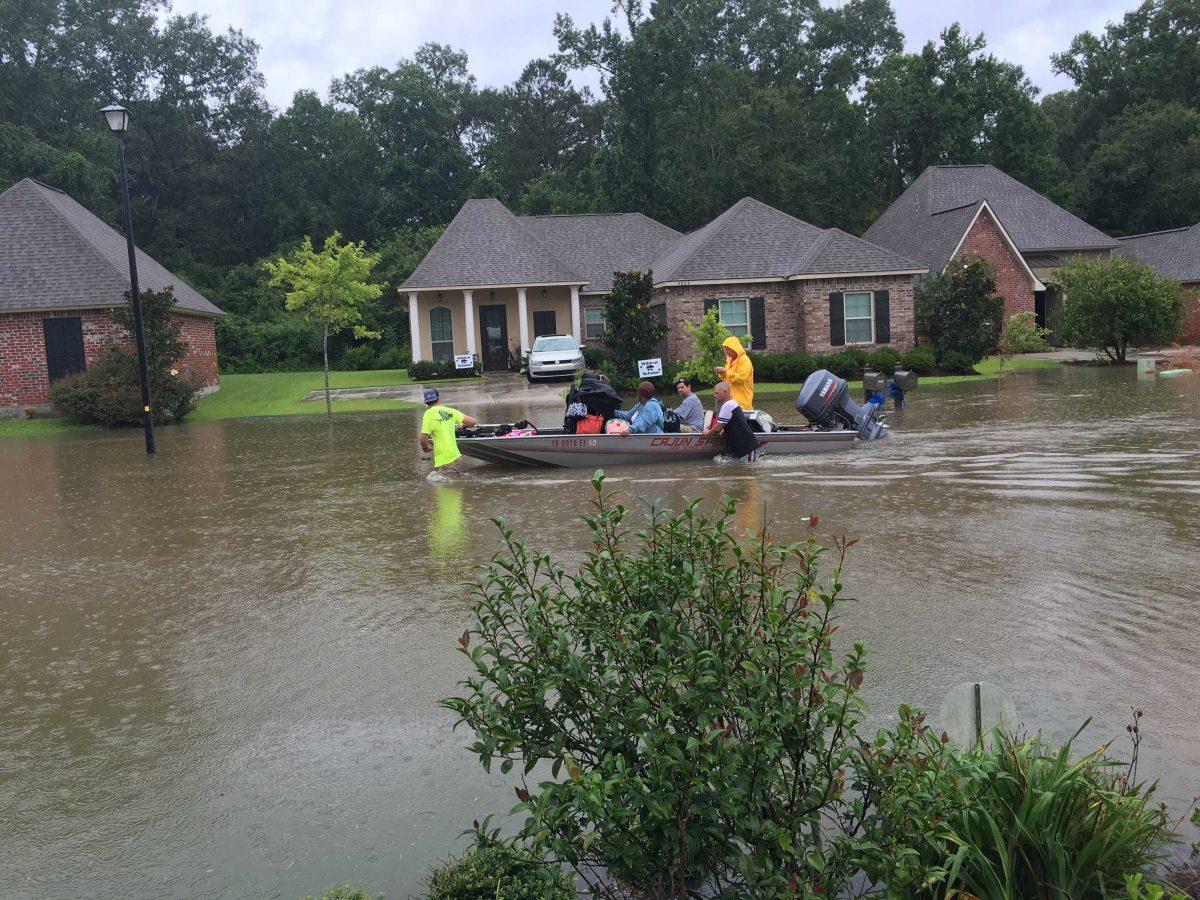The water was rising fast. Luke LeBas knew he needed to get out.
On the morning of Saturday, Aug. 13, LeBas gathered his family members, grabbed what few possessions he could find and drove to his brother-in-law’s house a mile down the road. Knowing they would be safe on higher ground, LeBas went back to his house to get his boat. When he left, he knew there was no going back.
“We just had to let it go,” LeBas said. “We knew we were safe. My kids were safe. My wife was safe. You know, a house is a house, but you can’t replace a family.”
As he contemplated starting his boat up, a man came over and asked him to rescue his daughter, who was handicapped. The water had risen from just a few inches to more than 2 feet on the road within the hour. Time was of the essence.
But 2 feet of water was still too shallow to start the motor. With the help of several neighbors, LeBas was able to put the girl and her caretakers in the boat and push it to safety.
When he came back to the neighborhood, he had a line of people waiting to be rescued from their homes.
“I’m guessing we took out 40 or 50 people,” LeBas said.
LeBas is just one of a few hundred volunteers who made rescues during the historic flooding of South Louisiana a month ago. These rescuers, dubbed the “Cajun Navy,” came from all across the state to help trapped people.
Many stores in the Baton Rouge area began selling “Cajun Navy” apparel after the flooding, including Bengals and Bandits near LSU, which had T-shirts honoring the rescuers.
The rescuers came from ordinary walks of life and some were paired with total strangers. LeBas said he worked with a man he had never met.
“Somebody actually came from Brusly, [Louisiana]” LeBas said. “He crossed the river, somehow got all the way to [Central], and that individual ended up helping me the whole day.”
These volunteers worked from dusk until dawn and helped rescue over 20,000 trapped residents. In Central, LeBas said he had to coordinate with other rescuers because the roads had become impassable.
He had to drop people off at certain high points and lead them to the next boat for pickup. As nightfall approached, LeBas decided to call off any more rescue attempts. But he found himself in trouble as the flood waters continued to rise.
“We parked the boat and we had to be rescued because we were still stuck on Planchet Road,” LeBas said. “So we had to wait in the dark until another boat was able to come and get us.”
LeBas was rescued later that night. When he visited his house for the first time after the flood, he said the water level was three feet high inside. No furniture or clothes were saved.
Like other Cajun Navy volunteers, LeBas was glad to have rescued the number of people he did. He knew if he had not gone out to save people, they would have been trapped.
LeBas grew up around boats his entire life. He was more concerned with the safety of the people he rescued. He said one child told him that he had never been in a boat before.
“I just kind of smiled and said, ‘Well, this is a tough place for your first ride, but we’ll get you out,’” LeBas said.
Some Cajun Navy volunteers are concerned about Republican state Sen. Jonathan Perry’s proposed legislation that would require volunteers to be trained and certified before going to make rescue attempts.
Perry made his case in an interview with News Talk 96.5 KPEL in Lafayette, Louisiana.
“At the end of the day, there are going to be two things that are going to be the hurdle when you approach it, from the state’s standpoint,” Perry said. “Liability is going to be number one for them. They don’t want the liability of someone going out to rescue someone and then not being able to find them, and secondly, there’s a cost.”
The senator faced criticism from several Cajun Navy volunteers after his comments. He later posted a Facebook video in which he said that his words were being twisted by some media outlets.
Perry said in the video that if no legislation is passed, then rescue volunteers will continue to be stopped by law enforcement officials for crossing over barricades and breaking the law.
“The intent of what I want to do is to completely un-regulate it to where our volunteers are not stopped from going out,” Perry said. “What’s happening is, it’s all getting twisted around like I’m trying to put a fee on it. I’m trying to tax it. I’m trying to require a permit.”
LeBas said he had not looked into the legislation, but he believes people are always going to help one another in times of crisis.
“People are going to do what they need to do in a time of distress,” LeBas said. “So legislation or no legislation, people are going to help.”
Cajun Navy comes from all walks of life, provides help to strangers
September 14, 2016
Cajun Navy





